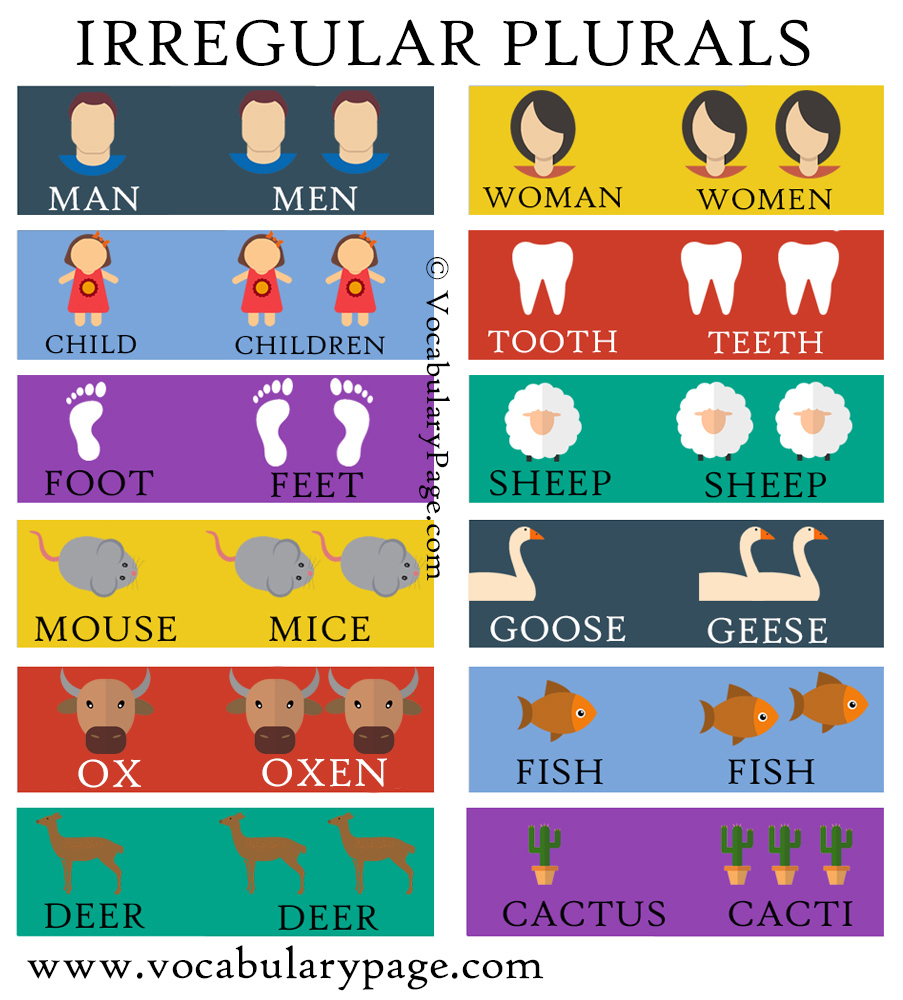Nouns can be singular and plural. When a noun indicates one person, animal, place, thing, or idea , it is a singular noun. When a noun indicates more than one, it is plural.



Some English nouns (countable nouns) have singular (street, book, dog) or plural (streets, books, dogs) forms.
Uncountable nouns don’t have plural forms.
- money
- water
- music
- information
How to from plural
Most singular nouns form the plural by adding -s.
- One book → Polly has two books.
- One pencil → The teacher gave me three pencils.
- A cat → We saw two cats outside the house.
- A question → Do you have any questions?
But there are also some specific spelling rules for plurals.
1. For nouns ending in ‘-s’, ‘-ss’, ‘-sh’, ‘-ch’, ‘-x’ and ‘-z’, add ‘-es’:
- A bus → All the buses stop here.
- A glass → I had two glasses of wine last night.
- A brush → I prefer soft brushes for my hair.
- A peach → Sandy bought fresh peaches at the market.
- A box → There were boxes with presents under the Christmas tree.
- A quiz → I like taking fun quizzes*.
| Note: When a word ends in a singular ‘z’, the ‘z’ is doubled and ‘-es’ is added. |
2. For nouns ending in a consonant + ‘-y’, change the ‘-y’ to ‘-ies’:
- A city → I visited many cities.
- A story → My grandmother knows many interesting stories.
- A country → How many countries are there in the world?
- A family → Ten families moved into new houses last month.
3. For nouns ending in ‘-y’ and the letter before the ‘-y‘ is a vowel, simply add an ‘-s’ to make it plural:
- A ray → X-rays can be used in many ways.
- A boy → How many boys are there in your class?
4. For most nouns ending in ‘-o‘, add ‘-s‘ (kilos, photos, radios, etc). But there are several common nouns that need ‘-es‘ instead:
- Potato → Jane bought two kilos of potatoes at the market.
- Tomato → Tomatoes are good in any salad.
- Hero → Batman and Superman are my two favorite superheroes.
- Echo → Loud echoes could be heard in the woods.
5. For nouns ending in ‘-f‘ or ‘-fe‘, change ‘-f / -fe’ to ‘-ves‘:
- A leaf → Many trees lose their leaves in Autumn.
- A wife → In some countries a man can have several wives.
- A knife → A good chef always takes care of his knives.
6. If the singular noun ends in ‘‑us‘, the plural ending is frequently ‘‑i‘:
- Cactus → There are many cacti in the desert.
- Focus → Optical elements have two foci.
7. If the singular noun ends in ‘‑is‘, the plural ending is ‘‑es‘:
- Analysis → The laboratory performs many different analyses.
- Basis → The theory has a variety of bases.
- Axis → The structure has three axes.
8. If the singular noun ends in ‘‑on‘, the plural ending is ‘‑a‘:
- Phenomenon → A variety of interesting phenomena is being discussed.
- Criterion → There are five criteria to consider.
9. Some nouns have a fixed plural form and take a plural verb. They are not used in the singular, or they have a different meaning in the singular:
- trousers, jeans, glasses, savings, thanks, steps, stairs, customs, congratulations, tropics, wages, spectacles, outskirts, goods, wits.
- Where are my blue trousers?
- These new glasses look great on you!
10. Some nouns have the same form in the singular and the plural:
- Sheep → The sheep ignore/ignores the dogs.
- Fish → There are many fish in the sea. (However, if different types of fish are meant, use ‘fishes’.)
Irregular plural nouns
Some nouns in English have irregular plural forms. Irregular nouns follow no specific rules, so it’s best to memorize them or look them up in the dictionary. The most common are:



Watch this video from Shaw English Online to see how plural nouns are formed:
See also: